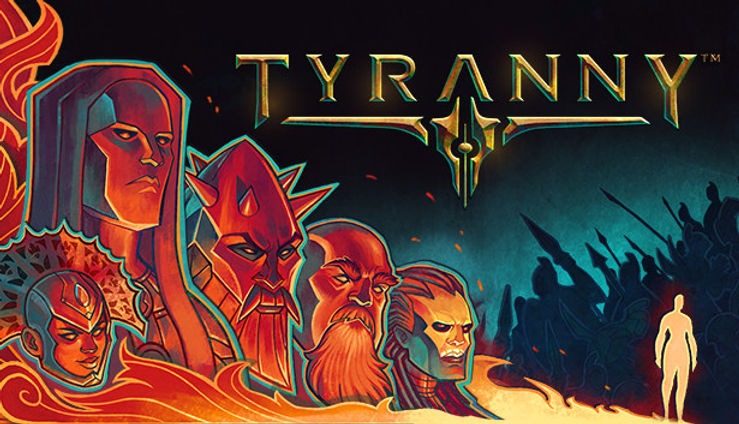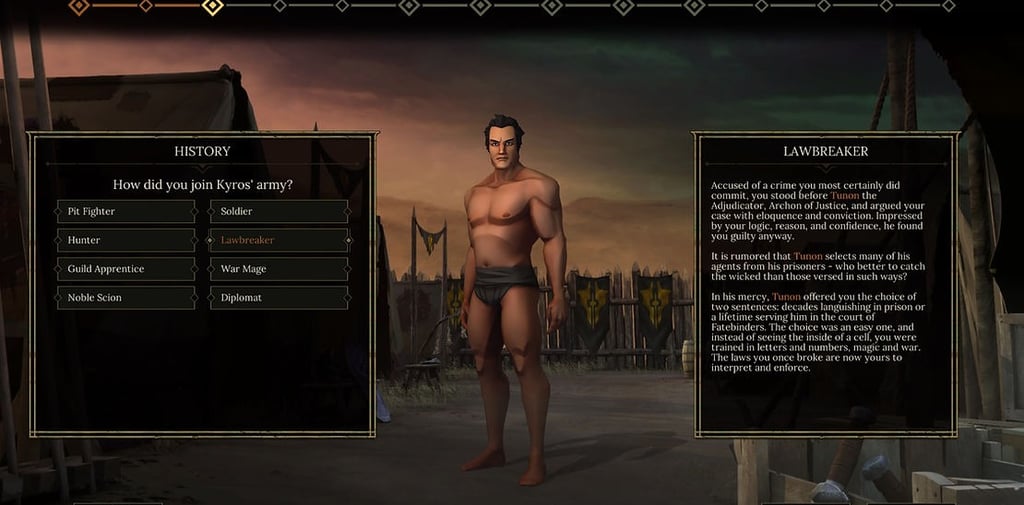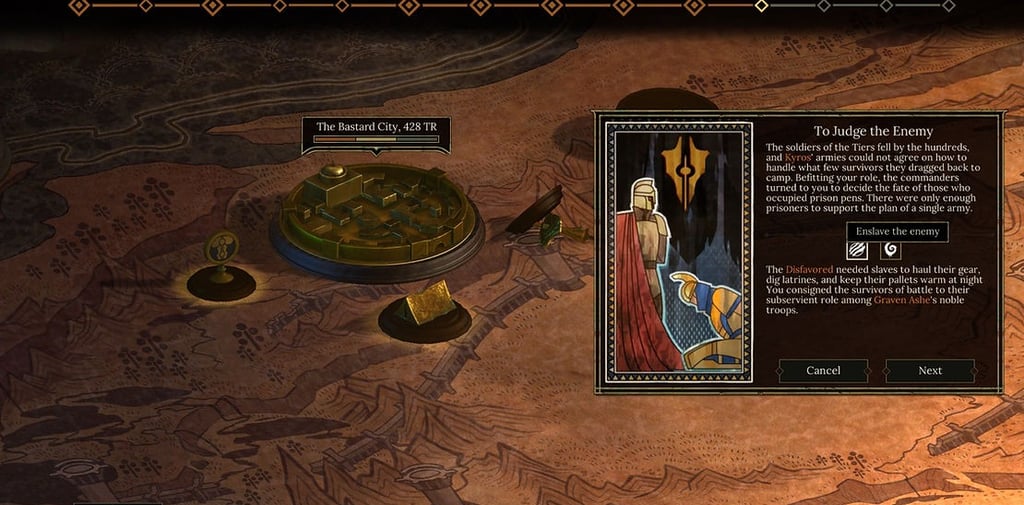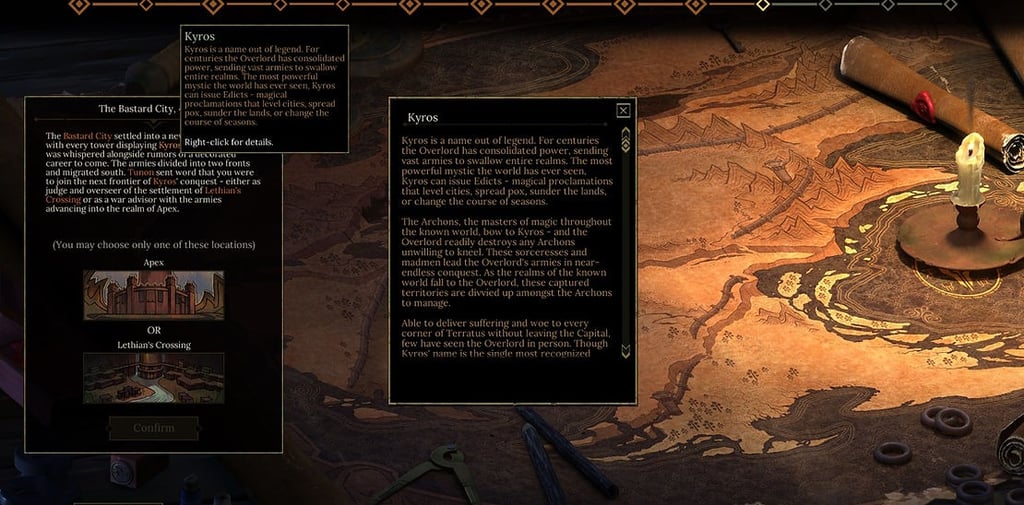Diegetic Player Characters: Studying Tyranny's Conquest System
GAME ANALYSIS
7/3/20255 min read


Tyranny (2016), developed by Obsidian Entertainment and published by Paradox Interactive, is a dark fantasy CRPG reminiscent of the old Baldur's Gate games, built on the tail of Pillars of Eternity 1. It is a rather obscure title to most, but the few that have played it have all been able to tell that this game was different, and that while the overall aspect felt like it lacked polish, it did a few things very right. Character creation is one of them, and I will here expand on why I think Tyranny should be a game to derive inspiration and learn from.

The promise - Character Creation
Giving a promise to the player: What you want to look for in a CRPG is player agency, to know that you have freedom in your actions and that your decisions have meaningful impact on the world. Upon creating a new game save, Tyranny sets the tone of its dark fantasy with a cinematic ending with this promise, that "The fate of thousands will rest in your hands".
Giving the player a role to play - Who are we in this world?:After that, character creation starts in a manner which you can expect from a CRPG, with a few standard presets to choose from, voice choices, ect... Two elements that can be noted early on though, already plant the seeds of creating an identity for your character in your mind: choosing a history, and creating a banner. You see, what is particular about Tyranny is that while you are free to create the identity of your character, that avatar has a pre-established role in the universe: you are a fatebinder, judge in the army of the evil overlord.
The second notable aspect of this character creation is the conception of a banner. It's a little thing, but it's enough to imbue in you the sense that you have importance in this world, and to think about the image you want to give others.


The conquest - WHO ARE YOU??
I have built a reputation, this world remembers me, is scarred by me: Now this is the really remarkable part of Tyranny. The conquest is an optional but highly recommended part at the end of character creation that lets you influence the default state of the world by acting out the actions of your character during the past 3 years of history. The conquest narrates the recent history of the world in a way that feels engaging because you’re making choices that have rippling consequences. This is the true promise of the game.
The war table - cost-effective storytelling: You have control of the pacing, taking as much time as you need to make your choices, even being able to go back and change them if you wish before validating all of them. This is all done in an immersive ludo-narrative experience, as it is all represented as moving pieces on a war table. This requires minimal assets on the part of the devs, and yet greatly engages the player’s imagination with the help of just a few stylized illustrations and some text.
I know who I am and the world knows it too: By the end of the conquest, you will have learned more about the world and your character than in any other game I’ve ever played. And it is all done in a ludic and engaging manner. You have built a reputation for your character that you feel you own and is echoed in the way characters interact with you from the get go.


Starting the game with a sense of ownership
A world of consequences from the get-go: When you start the game, you don’t suffer from the ‘baby morals syndrome’ that is present in too many RPGs. A case where you don’t understand the world or your character, and don’t feel grounded enough to make adult decisions. So instead you steal and kill your way through because you couldn’t care less, or obediently do whatever you’re told to because you don’t know any better. I've felt that way in countless games, some of which never let me create an identity that I felt was reflected in the world up to the very end.
But not in Tyranny. In Tyranny, you feel like you can make informed and granular choices right off the start of the adventure. By having the player make choices in the conquest, a controlled environment, before letting them loose on the open world of the game, Tyranny ensures you have a grasp on what is the tone of the game and the logic of how your choices affect the world and your reputation.
Lore in hyperlinks - an elegant solution to exposition: This echoes with an other excellent system of the game: Lore-specific words in the text are highlighted and link to a small definition/description that can be expanded.
This accomplishes multiple goals:
1) Characters can talk as they would in-universe without having to take you for an idiot because you as a player don’t understand it, but your character does.
and 2) It teaches you about the lore so that you can feel more part of the world and make more informed decisions as you play. And all of that without being forced on your playing experience;
You can simply ignore the colourful text if you’re not here for that kind of thing. It is a beautiful system: solving multiple problems with a very simple solution and no adverse effect on the player if they choose not to engage with it.


Instant immersion, a formidable start to an RPG
Tyranny knows what its promise is: The conquest, as an introduction to the game, is not about the combat system, loot, or skilltree, it is about roleplaying. The promise of the game is that you will make divisive choices and have to deal with their immediate or long term consequences. It teaches you right off the bat that deciding to follow a certain path will prevent you from taking others. The conquest system does an excellent job at setting up that promise.
Tyranny is by no means a flawless games. You can feel it had greater ambitions than means and feels rough around the edges. But everyone who has played it will tell you of its undeniable charm, unique identity, and ability to draw you in, right from character creation. So let's think more about how we can emulate that sense of immersion right from the start, to achieve that sense of ownership over the character you create and the reputation they have built.
Connect
Let's collaborate on your next game design project:
damien.f.rodriguez@gmail.com
© 2025. All rights reserved.